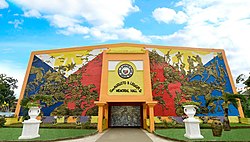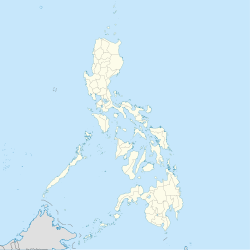Makato, officially the Municipality of Makato (Aklanon: Banwa it Makato; Hiligaynon: Banwa sang Makato; Tagalog: Bayan ng Makato), is a municipality in the province of Aklan, Philippines. According to the 2020 census, it has a population of 29,717 people.[3]
Makato
Taft | |
|---|---|
| Municipality of Makato | |
 Makato Sports Complex | |
| Nickname: Blooming Makato | |
| Motto: Hala Bira sa Progreso | |
 Map of Aklan with Makato highlighted | |
Location within the Philippines | |
| Coordinates: 11°42′43″N 122°17′32″E / 11.712°N 122.2922°E | |
| Country | Philippines |
| Region | Western Visayas |
| Province | Aklan |
| District | 2nd district |
| Barangays | 18 (see Barangays) |
| Government | |
| • Type | Sangguniang Bayan |
| • Mayor | Ramon Anselmo Martin D. Legaspi III |
| • Vice Mayor | Leoncito Y. Mationg |
| • Representative | Teodorico T. Haresco Jr. |
| • Municipal Council | Members |
| • Electorate | 21,282 voters (2022) |
| Area | |
• Total | 64.60 km2 (24.94 sq mi) |
| Elevation | 52 m (171 ft) |
| Highest elevation | 1,070 m (3,510 ft) |
| Lowest elevation | 0 m (0 ft) |
| Population (2020 census)[3] | |
• Total | 29,717 |
| • Density | 460/km2 (1,200/sq mi) |
| • Households | 7,394 |
| Economy | |
| • Income class | 4th municipal income class |
| • Poverty incidence | 20.17 |
| • Revenue | |
| • Appropriations | |
| • Assets | |
| • Liabilities | |
| • Expenditure | |
| • Obligation's | |
| Service provider | |
| • Electricity | Aklan Electric Cooperative (AKELCO) |
| Time zone | UTC+8 (PST) |
| ZIP code | 5611 |
| PSGC | |
| IDD : area code | +63 (0)36 |
| Native languages | Aklanon Hiligaynon Tagalog |
| Patron saint | Santo Niño |
| Website | www |
History
editEstablished in the thirteenth century, the town’s name had been acquired by accident. Thinking that the Spaniards came to ask the route along the river, the native answered “Makato” which meant “that way”. The Spaniards recorded the name Makato in 1800, thinking it was the name of the town. In 1901, the town merged with Tangalan to form the new municipality of Taft, named after the then Governor-General of the Philippines and future United States President, William Howard Taft. But in 1917, it was reverted to its former name.[11] In 1948, the arrabal of Tangalan, comprising the barrios of Tondog, Jawili, Dumatad, Afga, Baybay, Dapdap, Pudyot, Tagas, Tamalagon, Panayakan, Vivo, Lanipga, Napatag and Tamoko, was separated from Makato to form the municipality of Tangalan.[12]
Geography
editMakato is located at 11°42′43″N 122°17′32″E / 11.712°N 122.2922°E. It is 8 kilometers (5.0 mi) from Kalibo, the provincial capital.
According to the Philippine Statistics Authority, the municipality has a land area of 64.60 square kilometers (24.94 sq mi) [13] constituting 3.55% of the 1,821.42-square-kilometer (703.25 sq mi) total area of Aklan.
Climate
edit| Climate data for Makato, Aklan | |||||||||||||
|---|---|---|---|---|---|---|---|---|---|---|---|---|---|
| Month | Jan | Feb | Mar | Apr | May | Jun | Jul | Aug | Sep | Oct | Nov | Dec | Year |
| Mean daily maximum °C (°F) | 28 (82) |
29 (84) |
30 (86) |
32 (90) |
32 (90) |
31 (88) |
30 (86) |
30 (86) |
29 (84) |
29 (84) |
29 (84) |
28 (82) |
30 (86) |
| Mean daily minimum °C (°F) | 23 (73) |
22 (72) |
23 (73) |
24 (75) |
25 (77) |
25 (77) |
25 (77) |
24 (75) |
25 (77) |
24 (75) |
24 (75) |
23 (73) |
24 (75) |
| Average precipitation mm (inches) | 47 (1.9) |
33 (1.3) |
39 (1.5) |
48 (1.9) |
98 (3.9) |
150 (5.9) |
169 (6.7) |
147 (5.8) |
163 (6.4) |
172 (6.8) |
118 (4.6) |
80 (3.1) |
1,264 (49.8) |
| Average rainy days | 11.4 | 8.2 | 9.3 | 9.7 | 19.1 | 25.6 | 27.4 | 25.5 | 25.5 | 25.2 | 18.5 | 14.5 | 219.9 |
| Source: Meteoblue[14] | |||||||||||||
Barangays
editMakato is politically subdivided into 18 barangays.[15] Each barangay consists of puroks and some have sitios.
| PSGC | Barangay | Population | ±% p.a. | |||
|---|---|---|---|---|---|---|
| 2020[3] | 2010[16] | |||||
| 060411001 | Agbalogo | 3.8% | 1,127 | 990 | 1.30% | |
| 060411002 | Aglucay | 1.9% | 557 | 521 | 0.67% | |
| 060411003 | Alibagon | 2.2% | 641 | 543 | 1.67% | |
| 060411004 | Bagong Barrio | 1.6% | 487 | 429 | 1.28% | |
| 060411005 | Baybay | 7.0% | 2,077 | 1,916 | 0.81% | |
| 060411006 | Cabatanga | 4.2% | 1,246 | 1,144 | 0.86% | |
| 060411007 | Cajilo | 4.9% | 1,446 | 1,294 | 1.12% | |
| 060411008 | Calangcang | 5.8% | 1,715 | 1,701 | 0.08% | |
| 060411009 | Calimbajan | 7.0% | 2,068 | 1,855 | 1.09% | |
| 060411010 | Castillo | 3.2% | 956 | 791 | 1.91% | |
| 060411011 | Cayangwan | 7.2% | 2,125 | 2,058 | 0.32% | |
| 060411012 | Dumga | 7.3% | 2,170 | 2,107 | 0.30% | |
| 060411013 | Libang | 4.7% | 1,401 | 1,561 | −1.08% | |
| 060411014 | Mantiguib | 6.5% | 1,921 | 1,778 | 0.78% | |
| 060411015 | Poblacion | 11.1% | 3,288 | 3,172 | 0.36% | |
| 060411016 | Tibiawan | 2.9% | 869 | 785 | 1.02% | |
| 060411017 | Tina | 4.1% | 1,223 | 1,094 | 1.12% | |
| 060411018 | Tugas | 6.5% | 1,945 | 1,722 | 1.22% | |
| Total | 29,717 | 25,461 | 1.56% | |||
Demographics
edit| Year | Pop. | ±% p.a. |
|---|---|---|
| 1903 | 5,289 | — |
| 1918 | 11,661 | +5.41% |
| 1939 | 15,526 | +1.37% |
| 1948 | 9,939 | −4.84% |
| 1960 | 11,951 | +1.55% |
| 1970 | 13,287 | +1.06% |
| 1975 | 14,972 | +2.42% |
| 1980 | 16,732 | +2.25% |
| 1990 | 19,230 | +1.40% |
| 1995 | 21,955 | +2.51% |
| 2000 | 22,777 | +0.79% |
| 2007 | 25,043 | +1.32% |
| 2010 | 25,461 | +0.60% |
| 2015 | 27,262 | +1.31% |
| 2020 | 29,717 | +1.71% |
| Source: Philippine Statistics Authority[17][16][18][19] | ||
In the 2020 census, Makato had a population of 29,717.[3] The population density was 460 inhabitants per square kilometer (1,200/sq mi).
Economy
editPoverty incidence of Makato
10
20
30
40
50
2006
25.60 2009
48.94 2012
18.89 2015
20.08 2018
14.03 2021
20.17 Source: Philippine Statistics Authority[20][21][22][23][24][25][26][27] |
Religion
editDomicile of the Santo Niño and Ati-atihan Festival known throughout the province and a week ahead of Kalibo, Makato has been celebrating the “Mother of all Philippine Festivals” in admiration of the Holy Child.
Government
editElected officials
editMayor: Ramon Anselmo Martin D. Legaspi III
Vice Mayor: Leoncito Y. Mationg
Sangguniang Bayan Members:
- Nilo M. Amboboyog
- Marlene Mae Blaire T. Igham
- Nerli F. dela Cena
- Randy R. Vargas
- Rhine I. Roldan
- Abencio Honeyboy P. Torres III
- Leoncito Y. Mationg
- Steven M. Tejada
Liga ng Barangay (LnB): Shirly M. Lagradante
Sangguniang Kabataan Federation: Dina Mae Taladro
Infrastructure
editThe Aklan Sports Complex, opened in 2010, is located here in Makato. It hosted the 2010 Western Visayas Regional Athletic Association (WVRAA) Meet.[28]
References
edit- ^ Municipality of Makato | (DILG)
- ^ "2015 Census of Population, Report No. 3 – Population, Land Area, and Population Density" (PDF). Philippine Statistics Authority. Quezon City, Philippines. August 2016. ISSN 0117-1453. Archived (PDF) from the original on May 25, 2021. Retrieved July 16, 2021.
- ^ a b c d Census of Population (2020). "Region VI (Western Visayas)". Total Population by Province, City, Municipality and Barangay. Philippine Statistics Authority. Retrieved 8 July 2021.
- ^ "PSA Releases the 2021 City and Municipal Level Poverty Estimates". Philippine Statistics Authority. 2 April 2024. Retrieved 28 April 2024.
- ^ "COA Report - Makato, Aklan". Commission on Audit. Retrieved 24 May 2021.
- ^ "COA Report - Makato, Aklan". Commission on Audit. Retrieved 24 May 2021.
- ^ "Commission on Audit Financial Report (Aklan)". Commission on Audit. Retrieved 24 May 2021.
- ^ "Commission on Audit Financial Report (Aklan)". Commission on Audit. Retrieved 24 May 2021.
- ^ "Commission on Audit Financial Report (Aklan)". Commission on Audit. Retrieved 24 May 2021.
- ^ "Commission on Audit Financial Report (Aklan)". Commission on Audit. Retrieved 24 May 2021.
- ^ Act No. 2684 (March 9, 1917), An Act to Change the Name of the Municipality of Taft, Province of Capiz, to Makato, retrieved September 29, 2024
- ^ Republic Act No. 285 (16 June 1948), An Act Creating the Municipality of Tangalan in the Province of Capiz, archived from the original on 26 September 2013, retrieved 21 October 2016
- ^ "Province: Aklan". PSGC Interactive. Quezon City, Philippines: Philippine Statistics Authority. Retrieved 12 November 2016.
- ^ "Makato: Average Temperatures and Rainfall". Meteoblue. Retrieved 1 May 2020.
- ^ "Municipal: Makato". PSGC Interactive. Quezon City, Philippines: Philippine Statistics Authority. Retrieved 8 January 2016.
- ^ a b Census of Population and Housing (2010). "Region VI (Western Visayas)" (PDF). Total Population by Province, City, Municipality and Barangay. National Statistics Office. Retrieved 29 June 2016.
- ^ Census of Population (2015). "Region VI (Western Visayas)". Total Population by Province, City, Municipality and Barangay. Philippine Statistics Authority. Retrieved 20 June 2016.
- ^ Censuses of Population (1903–2007). "Region VI (Western Visayas)". Table 1. Population Enumerated in Various Censuses by Province/Highly Urbanized City: 1903 to 2007. National Statistics Office.
- ^ "Province of Aklan". Municipality Population Data. Local Water Utilities Administration Research Division. Retrieved 17 December 2016.
- ^ "Poverty incidence (PI):". Philippine Statistics Authority. Retrieved December 28, 2020.
- ^ "Estimation of Local Poverty in the Philippines" (PDF). Philippine Statistics Authority. 29 November 2005.
- ^ "2003 City and Municipal Level Poverty Estimates" (PDF). Philippine Statistics Authority. 23 March 2009.
- ^ "City and Municipal Level Poverty Estimates; 2006 and 2009" (PDF). Philippine Statistics Authority. 3 August 2012.
- ^ "2012 Municipal and City Level Poverty Estimates" (PDF). Philippine Statistics Authority. 31 May 2016.
- ^ "Municipal and City Level Small Area Poverty Estimates; 2009, 2012 and 2015". Philippine Statistics Authority. 10 July 2019.
- ^ "PSA Releases the 2018 Municipal and City Level Poverty Estimates". Philippine Statistics Authority. 15 December 2021. Retrieved 22 January 2022.
- ^ "PSA Releases the 2021 City and Municipal Level Poverty Estimates". Philippine Statistics Authority. 2 April 2024. Retrieved 28 April 2024.
- ^ "100315-R6-WVRAA4". Philippine Information Agency. July 9, 2018.
External links
edit



